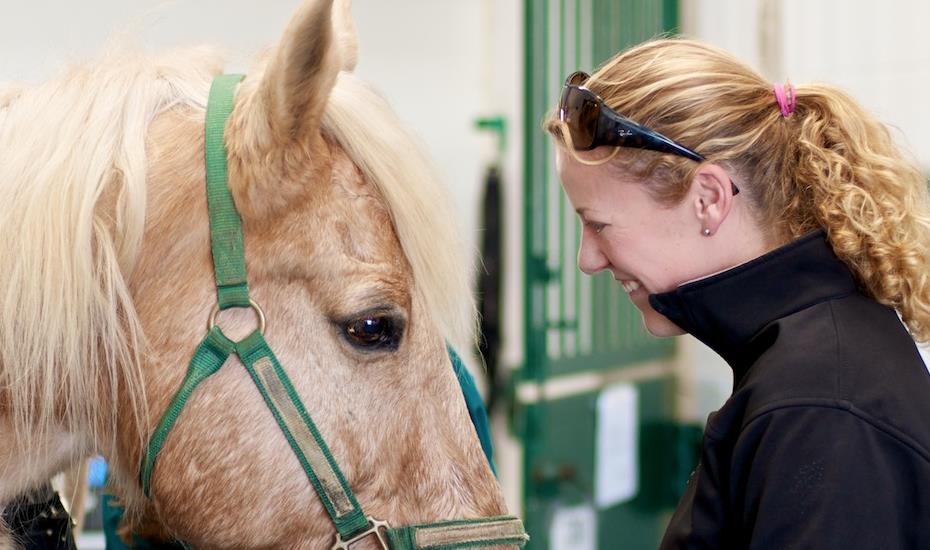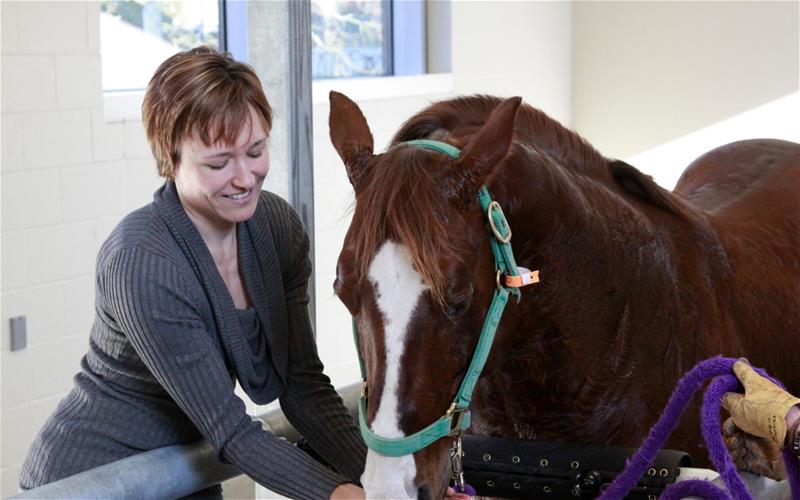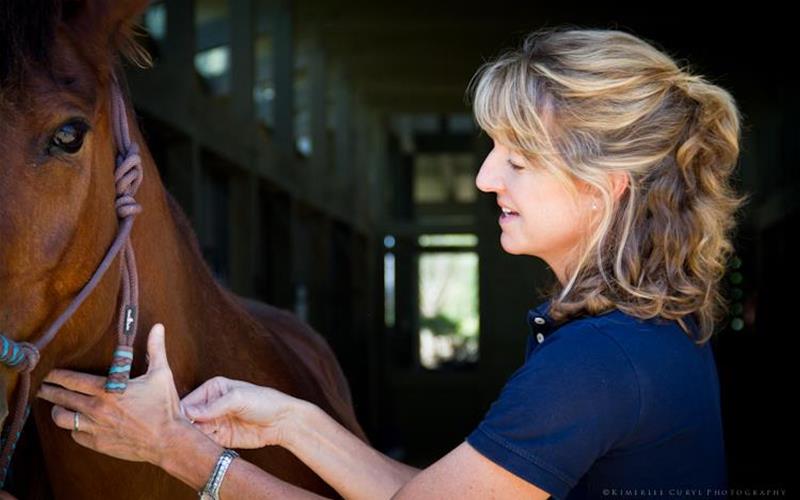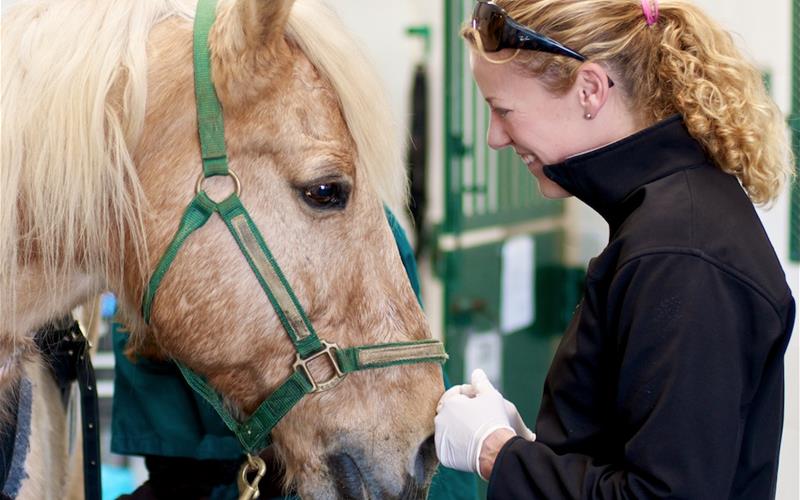

Search Help
Enter a country to search internationally or a city/state or zip to search within the US. If you select a country it will search only within that country. If you select only a state it will only search within that state. If you search for a zip code or city/state combo it will search within a proximityWhat is a Board-Certified Large Animal Internal Medicine Specialist?
Large Animal Internal Medicine (LAIM) Specialists focus on diagnosing and treating medical diseases of large animal species.
All LAIM Specialists are qualified to practice high-level specialty medicine on large animal species such as horses, cattle, goats, sheep, alpacas, llamas and others; however, many choose to specialize in one or a few of these types of animals. With specialized tools and an extensive knowledge of anatomy, physiology and internal medicine, LAIM Specialists are uniquely qualified to diagnose and manage a wide variety of problems.
Examples of conditions for which a large animal might benefit from evaluation by a Board-certified Large Animal Internal Medicine Specialist include:
- Acute or chronic diarrhea
- Anemia or bleeding disorders
- Coughing and other breathing problems
- Diseases of the nervous system
- Heart or circulatory disease
- Kidney or bladder disease
- Liver disease (Hepatitis)
- Poor performance, loss of speed or stamina
- Serious infectious disease
- Endocrine disorders
Many general practitioners diagnose and treat mild versions of these conditions, however, more complicated cases require the knowledge, skills and tools of the LAIM Specialist. Specialists have a greater understanding of internal medicine and a greater knowledge of the unusual, the uncommon, or rare conditions of large animals. This allows Board-certified Large Animal Internal Medicine Specialists to more accurately diagnose and treat these complicated conditions.
How does someone become a LAIM Specialist?
To become a Board-certified Large Animal Internal Medicine Specialists, veterinarians must complete extensive training after finishing veterinary school. Most LAIM Specialists will have completed a one year internship and a minimum of a three year LAIM residency. In addition to this training, they are required to pass a series of comprehensive examinations and publication requirements to become board-certified by the American College of Veterinary Internal Medicine (ACVIM). After passing these examinations, veterinarians become Diplomates of the ACVIM and can list the credentials “DACVIM” after their name. Not all veterinarians who call themselves “specialists” are board-certified. Board-certified LAIM Specialists are recognized experts in their fields and will have the DACVIM designation.
LAIM Specialists do not replace, but rather support your primary care veterinarian to ensure the best possible treatment and care for your animal. When you or your veterinarian feel that your animal might need a LAIM Specialist, it is important to provide the specialist all of the diagnostic and treatment information already performed. This also allows the LAIM Specialist to gain information about your animal’s condition that may aid in the continued care of your animal. Based on this history and the specialist’s initial evaluation, additional tests will be discussed. Depending on your animal’s condition, advanced diagnostic testing or treatments may include:
- Advanced laboratory testing of various tissue and blood samples
- Biopsies of masses, internal organs, or bone marrow
- Cerebral spinal fluid (CSF) taps for neurological diseases
- Diagnostic Imaging – ultrasound, radiography (x-rays), CT scans, MRIs
- Echocardiography – ultrasound of the heart
- Electrocardiography (ECGs) – electrical reading of the heart’s rhythm
- Endoscopy – bronchoscopy (lungs), cystoscopy (bladder & urethra), gastroscopy (stomach), rhinoscopy (nasal cavity & guttural pouches of horses), & laparoscopy (minimally invasive surgery for biopsies of internal organs)
Once your animal has been examined and treated, the LAIM Specialist often relies on your primary care veterinarian to perform follow up visits for continued monitoring or care of your animal. In this way, the best care is provided for your animal during and after their visit to the specialty practice. In other cases, your animal may stay in the care of the LAIM specialist at a specialized clinic that can provide intensive care during your animals illness.
Referral by a primary care veterinarian is common, but not required. Asking your primary care veterinarian for a referral to a LAIM specialist does not mean that you do not trust your veterinarian. Rather, it means that you are looking out for the best interests of your animal. You may contact an Internist directly if you prefer.
Why seek a LAIM Specialist?
Not all medical problems require the expertise of a specialist. However, there are some cases when the second opinion of a specialist might be a benefit for your animal. Examples include:
- The disease is uncommon, complicated or undiagnosed after standard testing.
- You would like an informed, neutral second opinion.
- The outcomes of the current treatments are not going well or as expected.
- Your animal requires a sophisticated procedure that is offered by a specialty hospital.
- Your animal can benefit from 24-hour monitoring provided by a referral hospital.
In addition to treating and diagnosing complicated conditions in large animals, LAIM Specialists are also actively involved in research and veterinary education. Many LAIM Specialists have active research programs that aim to learn more about the conditions that affect large animals. Internists are actively seeking the answers to how a condition occurs, what is the best way to diagnose the condition and what treatment options are available that effectively correct the condition. This knowledge improves veterinary management of diseases from the farm to the specialty practice. This may also mean that you may be asked to allow your animal to participate in a clinical research trial. By participating in such a trial, you will be allowing veterinarians to learn more about your animal’s condition and potentially provide new and improved diagnostic and treatment options for future affected animals.
Veterinary education is also important to the LAIM Specialist. From training veterinary students to providing continuing education courses to veterinarians, LAIM Specialists are often involved in improving veterinary knowledge and understanding. Specialists also commonly provide consultation for primary care veterinarians when questions arise about testing and treatment of internal medicine conditions.
Board-certified Large Animal Internal Medicine Specialists are highly trained veterinarians that are an important member of your animals health care team. You can find a LAIM Specialist near you using our search tool.
Edited by:
Brina Lopez, DVM, PhD, DACVIM (LAIM)
April, 2020



